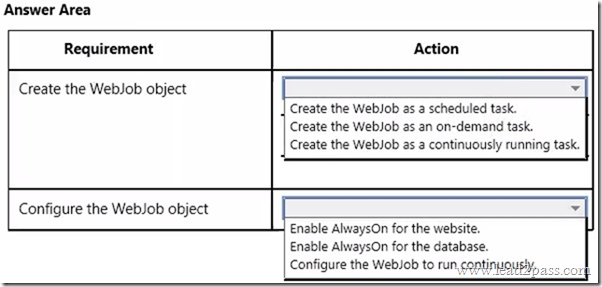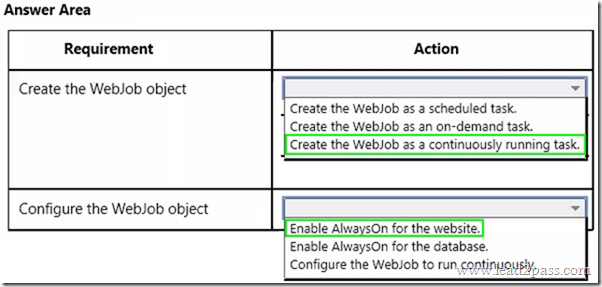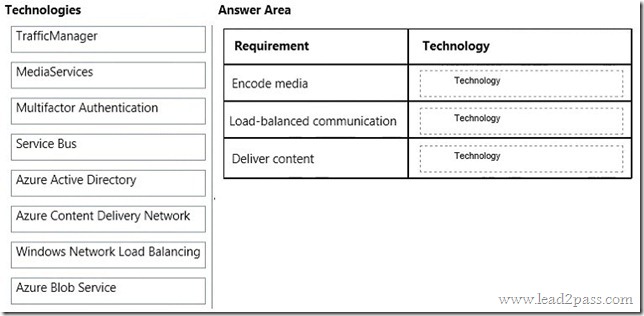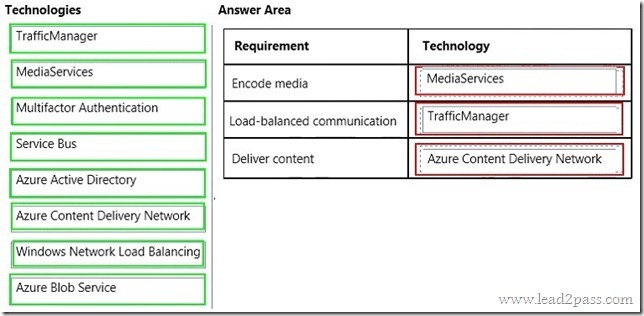[March 2018] Updated Lead2pass Microsoft 70-534 Braindump Free Download 230q
100% Free Lead2pass 70-534 New Questions Download:
https://www.lead2pass.com/70-534.html
QUESTION 31
You are designing a solution that will interact with non-Windows applications over unreliable network connections.
You have a security token for each non-Windows application.
You need to ensure that non-Windows applications retrieve messages from the solution.
Where should you retrieve messages?
A. An Azure Queue
B. The Azure Service Bus Queue
C. An Azure blob storage container that has a private access policy
D. Azure Table storage
Answer: B
Explanation:
Any Microsoft or non-Microsoft applications can use a Service Bus REST API to manage and access messaging entities over HTTPS.
By using REST applications based on non-Microsoft technologies (e.g. Java, Ruby, etc.) are allowed not only to send and receive messages from the Service Bus, but also to create or delete queues, topics and subscription in a given namespace.
Service Bus Explorer
https://code.msdn.microsoft.com/windowsazure/service-bus-explorer-f2abca5a
QUESTION 32
You are the administrator for a company named Contoso, Ltd.
Contoso also has an Azure subscription and uses many on-premises Active Directory products as roles in Windows Server including the following:
– Active Directory Domain Services (AD DS)
– Active Directory Certificate Services (AD CS)
– Active Directory Rights Management Services (AD RMS) Active Directory Lightweight Directory Services (AD LDS) Active Directory Federation Services (AD FS).
Contoso must use the directory management services available in Azure Active Directory.
You need to provide information to Contoso on the similarities and differences between Azure Active Directory and the Windows Server Active Directory family of services.
Which feature does Azure Active Directory and on-premises Active Directory both support?
A. Using the GraphAPI to query the directory
B. Issuing user certificates
C. Supporting single sign-on (SSO)
D. Querying the directory with LDAP
Answer: C
Explanation:
AD FS supports Web single-sign-on (SSO) technologies, and so does Azure Active Directory.
If you want single sign on we usually suggest using ADFS if you’re a Windows shop. Going forward though, Azure Active Directory is another alternative you can use.
Using Azure Active Directory for Single Sign On with Yammer
https://samlman.wordpress.com/2015/03/02/using-azure-active-directory-for-single-sign-on-withyammer/
QUESTION 33
A company has a very large dataset that includes sensitive information.
The dataset is over 30 TB in size.
You have a standard business-class ISP internet connection that is rated at 100 megabits/second.
You have 10 4-TB hard drives that are approved to work with the Azure Import/Export Service.
You need to migrate the dataset to Azure.
– The solution must meet the following requirements:
– The dataset must be transmitted securely to Azure.
– Network bandwidth must not increase.
– Hardware costs must be minimized.
What should you do?
A. Prepare the drives with the Azure Import/Export tool and then create the import job.
Ship the drives to Microsoft via a supported carrier service.
B. Create an export job and then encrypt the data on the drives by using the Advanced
Encryption Standard (AES). Create a destination Blob to store the export data.
C. Create an import job and then encrypt the data on the drives by using the Advanced
Encryption Standard (AES). Create a destination Blob to store the import data.
D. Prepare the drives by using Sysprep.exe and then create the import job.
Ship the drives to Microsoft via a supported carrier service.
Answer: A
Explanation:
You can use the Microsoft Azure Import/Export service to transfer large amounts of file data to Azure Blob storage in situations where uploading over the network is prohibitively expensive or not feasible. Use the Microsoft Azure Import/Export Service to Transfer Data to Blob Storage
http://azure.microsoft.com/en-gb/documentation/articles/storage-import-export-service/
QUESTION 34
Hotspot Question
You have an Azure website that runs on several instances.
You have a WebJob that provides additional functionality to the website.
The WebJob must run on all instances of the website.
You need to ensure that the WebJob runs even when the website is idle for long periods of time. How should you create and configure the WebJob object? To answer, select the appropriate options in the answer area.
Answer:
Explanation:
* You can run programs or scripts in WebJobs in your App Service web app in three ways: on demand, continuously, or on a schedule.
* For continuous WebJobs there is an important feature called “always on” which is only available for a Standard Website, this will make sure your Website and WebJob are always up.
Run Background tasks with WebJobs
http://azure.microsoft.com/en-us/documentation/articles/web-sites-create-web-jobs/
QUESTION 35
Drag and Drop Question
You have a website that displays text, pictures, video files, and audio files.
The website processes requests from countries and regions all over the world.
You plan to migrate the website to the Azure platform.
The website has the following requirements:
– Encode, store, and stream audio and video at scale.
– Load-balance communications with the website instance that is closest to the user’s location.
– Deliver content with high-bandwidth and low latency.
You need to recommend the technologies to implement the solution.
Which technologies should you recommend? To answer, drag the appropriate technology to the correct requirement. Each technology may be used once, more than once, or not at all. You may need to drag the split bar between panes or scroll to view content.
Answer:
Explanation:
* MediaServices
Azure Media Services is being used to power consumer and enterprise streaming solutions worldwide. Combining powerful and highly scalable cloud-based encoding, encryption and steaming components, Azure Media Services is helping customers with valuable and premium video content to easily reach larger audiences on today’s most popular digital devices, such as tablets and mobile phones. Media Services, Cloud for Premium Video Workflows
http://azure.microsoft.com/en-gb/services/media-services/
* TrafficManager
Traffic Manager, Geo-route incoming traffic to your app for better performance and availability
http://azure.microsoft.com/en-us/services/traffic-manager/
* Azure Content Delivery Network
The Azure Content Delivery Network (CDN) is designed to send audio, video, applications, images, and other files faster and more reliably to customers using servers that are closest to each user. This dramatically increases speed and availability, resulting in significant user experience improvements.
Azure CDN, A fast and modern global delivery network for high-bandwidth content
http://azure.microsoft.com/en-us/services/cdn/
QUESTION 36
You are designing a Windows Azure application that will use Windows Azure Table storage.
The application will allow teams of users to collaborate on projects.
Each user is a member of only one team.
You have the following requirements:
– Ensure that each user can efficiently query records related to his or her team’s projects.
– Minimize data access latency.
You need to recommend an approach for partitioning table storage entities.
What should you recommend?
A. Partition by user.
B. Partition by team.
C. Partition by project.
D. Partition by the current date.
Answer: B
QUESTION 37
You are designing a Windows Azure application that will store data in two SQL Azure databases. The application will insert data in both databases as part of a single logical operation.
You need to recommend an approach for maintaining data consistency across the databases.
What should you recommend?
A. Execute database calls on parallel threads.
B. Wrap the database calls in a single transaction scope.
C. Use Microsoft Distributed Transaction Coordinator (MSDTC).
D. Handle errors resulting from the database calls by using compensatory logic.
Answer: D
Explanation:
https://msdn.microsoft.com/en-us/library/dn589800.aspx
QUESTION 38
You are designing a Windows Azure application.
The application includes two web roles and three instances of a worker role.
The web roles will send requests to the worker role through one or more Windows Azure Queues.
You have the following requirements:
– Ensure that each request is processed exactly one time.
– Minimize the idle time of each worker role instance.
– Maximize the reliability of request processing.
You need to recommend a queue design for sending requests to the worker role.
What should you recommend?
A. Create a single queue.
Send requests on the single queue.
B. Create a queue for each web role.
Send requests on all queues at the same time.
C. Create a queue for each worker role instance.
Send requests on each worker queue in a round robin.
D. Create a queue for each combination of web roles and worker role instances.
Send requests to all worker role instances based on the sending web role.
Answer: A
70-534 dumps full version (PDF&VCE): https://www.lead2pass.com/70-534.html
Large amount of free 70-534 exam questions on Google Drive: https://drive.google.com/open?id=0B3Syig5i8gpDaTBTRVp4SktqMXM
You may also need:
70-532 exam dumps: https://drive.google.com/open?id=0B3Syig5i8gpDbm1XNUxwQUYwaWM
70-533 exam dumps: https://drive.google.com/open?id=0B3Syig5i8gpDclh4YVRORS1vaHc



